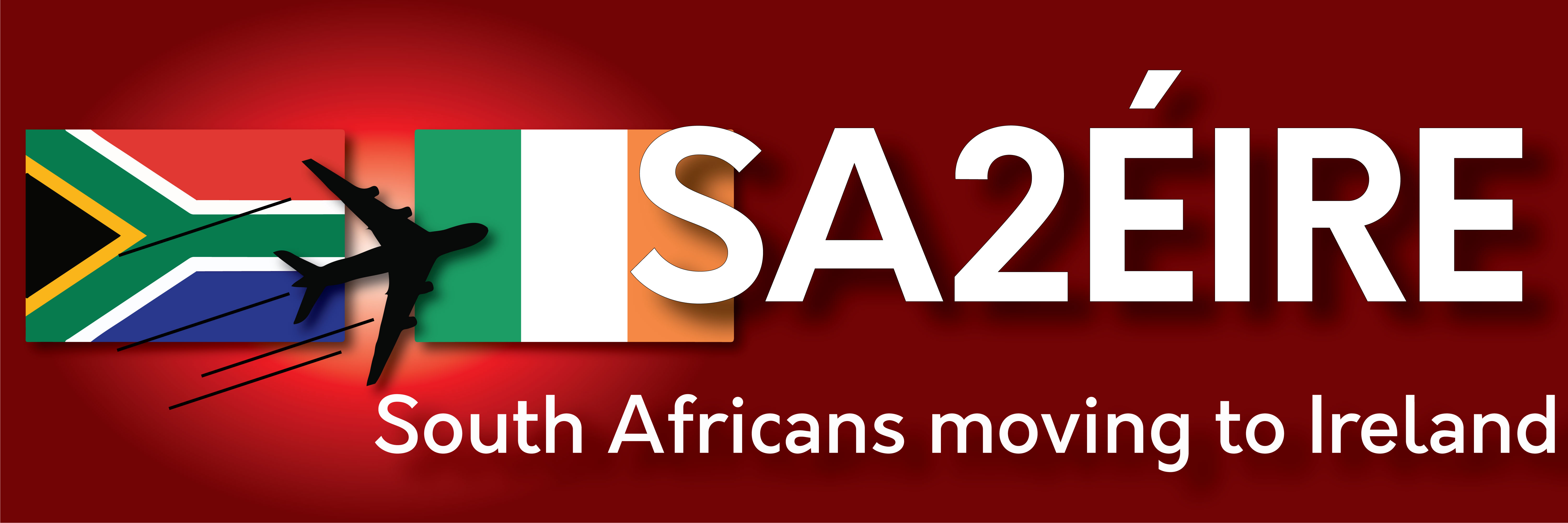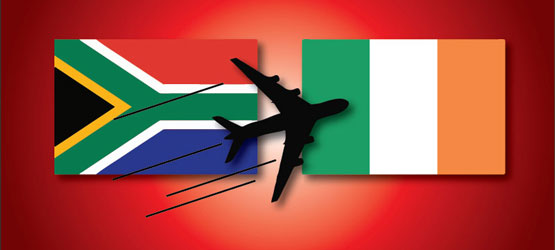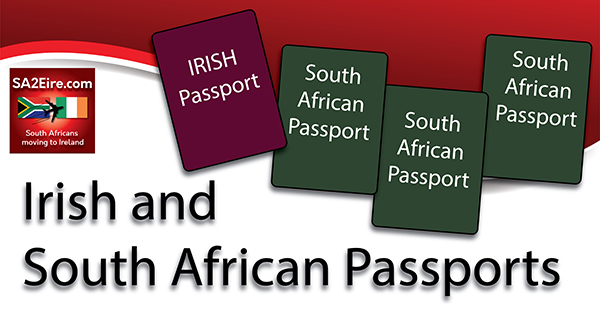This section is for Irish passport holders with South African dependants (spouse and/or children and/or De Facto partners), moving to Ireland.
For now, we will assume you are already in possession of an Irish passport.
If you want to see if you're eligible for Irish citizenship by descent see Foreign Birth Regsitration and if you are already irish and need to apply for your Irish passport: Applying for first time Irish passport (2022)- this will download as a .pdf in your device's download files
EU law vs Irish Laws
With an Irish passport moving to the Republic of Ireland you will be moving under domestic Irish law, not EU law, as you are “coming home” or “returning Irish” not moving to a foreign country, even if you have never set foot in Ireland and applied for your passport via birth or registration.
In doing so, you will need to follow the process of Irish laws that govern such things as age of dependants and who qualifies as dependants. As such you should ignore all discussion and postings around EU Treaty as this does not apply to you, even though you are an EU citizen, you are primarily Irish moving to Ireland.
As you are moving to Ireland under domestic law, you do not get the visa free travel an EU member would applying under EU law. So, if you travel to the EU, your SA members need visas to visit that country. Similarly as the UK has left the EU, even though visa free travel applies to the Irish passport holder, travel to the UK for your SA members means they need visas to visit the Uk, including Northern Ireland.
“Please note that we cannot accept applications under EU Treaty Rights provisions from non-EEA family members of Irish nationals.
Directive 2004/38/EC on the right of citizens of the EU and their family members to move and reside freely within the territory of the Member States applies only to Union citizens who move to or reside in a Member State other than that of which they are a national”
irishimmigration.ie (ISD)
“If you are returning to Ireland with an EEA spouse, civil partner, de facto partner or other family member, they may enter Ireland freely.
If you are an Irish citizen returning (coming) to Ireland with a non-EEA spouse, civil partner, de facto partner or other family member, you should be aware that there is no automatic entitlement under Irish law for you to have them join you in Ireland.
They will need to apply for residency permission from the Irish immigration services.”
Citizens Information
The activities that will be permitted (for example the right to work without an employment permit, establish or manage/operate a business) will depend on the immigration permission granted to you by the Irish immigration authorities following your entry to the State. If you are an immediate family member of an Irish citizen you will receive a Stamp 4 immigration permission which will allow you to work without an employment permit or to establish or manage/operate a business. If you are an immediate family member of a non-EEA sponsor or are a non-immediate family member of an Irish citizen you will have dependent status only, and will continue to be subject to the employment permits requirements as operated by the Department of Enterprise, Trade and Employment (DETE). However, you will be entitled to apply for immigration status in your own right under the various channels available (for example student, work permit or business permission).
Irish Immigration
Entry for the eligible South African passport holding dependents
of an Irish citizen
If all your eligible dependents are South African passport holders, they do not need an entry visa into Ireland, if you and your partner are LEGALLY MARRIED.
Non-married or people who married under a religious married not followed up with a formal legal marriage and marriage certificate, you would be considered De facto and need to follow (below) the visa entry requirement.
If you are legally married, there is no Irish or EU paperwork to be filled out before leaving South Africa and for that matter no paperwork submitted at landing in Ireland, it is all done from within Ireland. This is because Ireland and South Africa have a special agreement that allows South Africans to enter Ireland “visa free.” This entry, however, is subject to having the correct paperwork with you.
You should inform the BMU officer at the airport/point of entry into Ireland of your intention to apply for residency based on your marriage/civil partnership with an Irish citizen.
This is NOT a holiday visa stamp, it's captured as an Irish dependant entry on the system and in the passport. Holiday stamps are different.
You should bring the required documentation and at point of entry Border Management Unit (BMU) will issue up to 90 days stamp in the South African Passports.
There are special conditions for the De Facto (Unmarried) spouse of an Irish citizen, or if you are married under a religious marriage not one in law.
This includes proof of 2-years living at the same address, in a married-like relationship and a pre-clearance visa.
There are also potential hiccups for people who marry just before immigration as this can be seen as a "marriage of convenience" and therefore read over the De Facto information on this site and the hurdles that might be faced.
See the Info below on De Facto if you are not married or recently married
There are special conditions for the Elderly parents of an Irish citizen or their spouse, this would also require a pre-clearance D visa, see below for more info
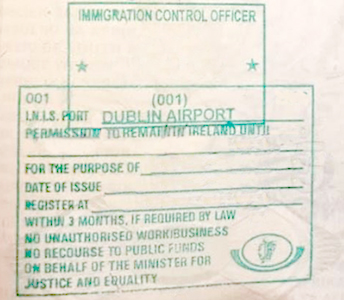
Registering the South African members
After you have entered Ireland you must register with an Immigration Officer.
You should do this within 90 days of your arrival or within the period specified on the stamp provided to you in your passport at the airport (which maybe for less than 90 days).
You and your Irish spouse and children should go together to register.
If you are living in Dublin you need to make an appointment to go to the Irish Naturalisation and Immigration Service Registration Office at 13/14 Burgh Quay, Dublin 2.
If you are living outside Dublin, you should go together to your Garda District Headquarters.
Register at Garda Immigration - How to register at Garda Immigration and Renewals of Residency stamps
There are no fees to pay at these registrations as you are Irish dependants.
Who are dependants that an Irish passport holder can sponsor?
Spouse (Married)
You will need to provide your Unabrigded (Full) Marriage cert or your Civil Union Cert.
When approved the Spouse will receive a Stamp 4 immigration permission which allows them to live and work in Ireland without the need for an employment permit, until this permission is granted, the Non-EU spouse cannot start working and in some areas it takes about 16-18 weeks to get this stamp, so be sure to BUDGET accordingly.
Initially this may only be a stamp in your passport, and you may need to return a few weeks later to receive your Irish Residence Permit (IRP, previously known as GNIB card).
You might only get 1 year Stamp4 which needs to be renewed again before expiry.
Your spouse or civil partner is not entitled to work in Ireland until a Stamp 4 has been issued.
If a Stamp 4 is not granted immediately, your spouse or civil partner may be asked to make a written application for residency (pdf) (Res6 document) to INIS. This can happen if there are any issues that need to be clarified such as identity, criminal history or relationship history/ recent marriages. Read below on Newly Married Couples.
Children
Children under the age of 18 years are automically considered dependants
Children under 16 years do not need to be registered, when they turn 16 years they need to be registered at Garda Immigration
Children can be the biological child of both or either the Irish or Non-EU member, or formally adopted children of both or either
Children 18-23 years need to be proven dependants and enrolled in tertiary education to qualify:
Children are minor dependents under the age of 18 years, or dependents in full-time education up the age of 23 years, of either the Irish citizen or their non-EU spouse, civil partner or de facto partner.
For applications of children 18-23 years you need to have them enrolled in study and be proven dependants.
If you have children aged between 16 and 18, or under 23 and in full time education, they must register with ISD if they are not Irish, British, Swiss or EEA citizens.
You may be considered to be a family dependent if:
- You are aged between 16 and 18, or
- You are under the age of 23 and in full time education
- Your sponsor is an Irish national, or a person married to an Irish national
- You normally live together with your sponsor as a member of a family unit
- You do not normally live separately or apart on a permanent basis.
Children over 16 years usually get a Stamp3 which means they are resident but cannot work, but might in some circumstances get a Stamp4
If this happens you need to show this link to the Garda see the FAQ on What type of permission is granted
If an Irish citizen who is living abroad adopts a child abroad, they should apply for the adoption to be entered in the Register of Intercountry Adoptions.
Once it is registered, the adoption has the same legal status as if the adoption was made in the State. HERE
Newly married couples
This may be in cases where couples are very recently married or the Garda immigration officer believes the marriage needs further investigation and/or if either member has criminal convictions. Read more on DE FACTO relationships, whilst you do not need to do the pre-clearance visa, it might be a good idea to gather the proof as if you were a DE FACTO relationships to prove your marriage is not phony or constructed for the purposes of immigration. It might be a good idea to be prepared IN CASE its asked for. De Facto
If a Stamp 4 is not granted (this can happen if there are any issues that need to be clarified such as identity, criminal history or relationship history), your spouse or civil partner may be asked to make a written application for residency (pdf) (Res6 document) to INIS.
This may be in cases where couples are very recently married or the Garda immigration officer believes the marriage needs further investigation and if either member has criminal convictions.
In this case this application can take up to 6 months, in which case temporary residence will be granted pending approval.
If this does occur additional documentation may be required (some of which will be from South Africa)
It may be a good idea to have these documents on the 'in case'. See Required documents.
The Non-EEA member will not be able to work in this time.
As the Spouse or child of an Irish citizen, you can apply to naturalise and then get your Irish citizenship after 3 years of living in Ireland subject to the Residency Calculator and proofs that are collected of co-habitation with the Irish citizen in the Republic of Ireland.
Other Family Members
Other dependents may be eligible to come, and these may include elderly parents or adult dependents.
These groups have no automatic right to come to Ireland but in some circumstances can get permission.
Family Reunification for Irish citizens’ dependents is not as clear cut as say an EU member moving with extended family.
EU law is used when for example a French passport holder moves to Ireland with their children and dependent elderly parents.
In the case of an Irish citizen wanting to bring a dependent adult outside of the marriage but direct line family, it requires a lot more evidence and there are financial qualifiers too.
Read more on Family reunification
Please not these members need to apply for a pre-clearance visa before coming to Ireland and will be on a Stamp0and under those conditions of residency
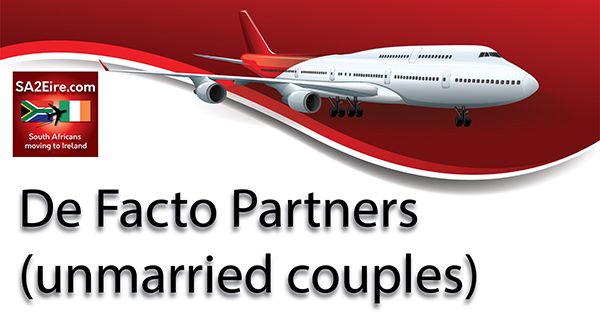
De Facto Partner (unmarried) of an Irish citizen
A De Facto partnership is a relationship that is like marriage but that has not been legally recognised or registered.It would include people who had a religious ceremony which is not recognised by the Irish laws. If you hold an Unabridged (Full) Marriage certificate or a Civil Union certificate, you are legally married, you are not De facto.
There are some key requirements to showing you are in a de facto partnership:
- You must have lived together at the same address, for at least 2 years (this is known as ‘co-habitation’)
- You must be able to prove this.
- A real, durable relationship, this is proof that the relationship is real, and you have been in this relationship a minimum of 2 years (from the age of 18 years).
An application must be made to the Irish Naturalisation & Immigration Service and it can take 6 months for this to be processed.
It also means the South African De Facto spouse cannot come to Ireland in this time.
Please make certain you follow the Pre-clearance process BEFORE leaving South Africa, you will need this permission in place.
Read more here on WHAT proof is required for the De Facto application and how to get it processed.
What documents should I take to the Garda Immigration appointment?
Register at Garda Immigration - How to register at Garda Immigration and Renewals of Residency stamps, includes documents needed and conditions to get the stamp
Take particular note, WHERE you move to makes the biggest difference on how long it takes to get an appointment, the Non-EU spouse cannot start working and in some areas it takes about 16-18 weeks to get this stamp, so be sure to BUDGET accordingly.
Dependants of Irish passport holders,
and the residency status if the Irish sponsor
Dual Passport holders
South Africans who hold Irish, British or EU passports, if you were born in South Africa, or you took up citizenship of South Africa by naturalisation or other means, you need to have a South African passport in order to leave the airports in South Africa.
A good check to see your status, is to open your South African Identification Document (ID BOOK), if it says South African Citizen on the front page where your details are, you need to apply for a South African passport.
If you open your foreign passport and you see where you were born, it will show this when you pass through South African passport control, and they will ask you for your SA passport.
Apply at your local Home Affairs.
Dual Nationals depending on how and at what age you obtained your other citizenship, other than South African, may need permission to have that second passport. Please confirm this at your local Home Affairs office.
"Please note that in terms of the South African Citizenship Amendment Act of 2004 it is now an offence for a major South African citizen to enter the RSA or depart making use of the passport of another country. Essentially, the Amendment Act provides that a South African citizen, who has dual nationality, can freely use his or her foreign passport outside South Africa. However, they must use their South African passport to enter or to depart from South Africa." Citizenship Act 2004 download.pdf here
Dependants becoming an Irish Citizen by Naturalisation
As the immediate family member of an Irish citizen, you can apply to naturalise and then get your Irish citizenship after 3 years of living in Ireland subject to the Residency Calculator and proofs that are collected of co-habitation with the EU citizen in the Republic of Ireland.
Permanent Residence and Naturalisation - How this works and how to prepare yourself from day 1 for five years time (or 3 years if irish spouse)
Zambrano- Non-EU parent(s) of an Irish child
If you already have a permission stamp (eg: a work permit and you are already living in Ireland you can make the application at Garda immigration with all the required proof)
If not, you have to send off a particular form to get approved before you can get your Stamp4
Note: this route may mean the parents are not allowed to work whilst the processing takes place of the permission. It can take a few weeks or anything up to 12 months to be approved it will down to them and proof given.
Once approved you can seek work and all efforts need to be made to remain employed. So, please make sure you have sufficient funds to keep yourselves going in that time, should you choose this route. If that is not available, you may want to look at getting work permits instead.
From the 1st October 2015 all applications for permission to remain in the State on the basis of parentage of an Irish Citizen Child from a Non-EEA parent must be submitted on the application for permission to remain in the State on the basis of parentage of an Irish Citizen Child for a Non-EEA Parent.
Take note of the FAQ's on the link below to Zambrano.
Travel to the UK or EU
Whilst an Irish passport holder is part of the EU and the CTA, travel to the Uk and EU for them is visa free
However for your SA passport holding spouse and children, they would need Uk Standard visitor visas to go to the Uk (including Northern Ireland) and for each EU country a schengen visa for that country
Will an Irish visa allow me to travel to Northern Ireland?
- No. If you wish to travel to Northern Ireland, you will require a UK visa.
- Northern Ireland consists of Counties Antrim, Armagh, Derry, Down, Fermanagh and Tyrone.
- If you intend to also visit Northern Ireland and return to the Republic, you must obtain a UK visa.
Many flights go via the UK, however, please note any South African only passport holder will need to be in possession of a FULL UK STANDARD VISITOR visa if you fly from UK to Ireland.
Even though you are inside the airport, you actually pass through an international terminal into a domestic terminal and are therefore considered inside the UK.
This does not apply if YOU hold a UK/Irish or EU passport, but if for example your spouse or child does not hold a UK/Irish or EU passport THEY will need a UK Standard visitor visa.
I'm a South African passport holder, do I need a visa to go to the EU and/or UK? - A question that gets asked regularly on visas to the EU and Uk from Ireland once people are resident in Ireland

Important links:
 Our coaching Services - Confused or lost and need some direction, book a session with us to help untangle the confusion and work out your route of immigration
Our coaching Services - Confused or lost and need some direction, book a session with us to help untangle the confusion and work out your route of immigration
 De Facto partner of Irish Citizen Pre-clearance before leaving South Africa
De Facto partner of Irish Citizen Pre-clearance before leaving South Africa
 Pre-clearance D visa for non-immediate family members
Pre-clearance D visa for non-immediate family members
